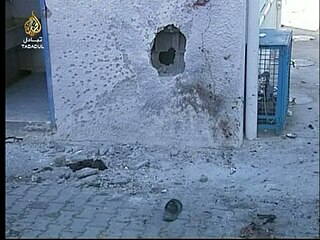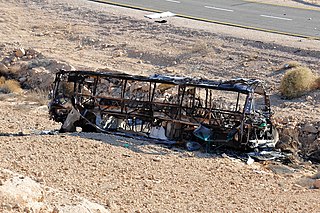
The United Nations Relief and Works Agency for Palestine Refugees in the Near East is a UN agency that supports the relief and human development of Palestinian refugees. UNRWA's mandate encompasses Palestinians who fled or were expelled during the Nakba, the 1948 Palestine War, and subsequent conflicts, as well as their descendants, including legally adopted children. As of 2019, more than 5.6 million Palestinians are registered with UNRWA as refugees.
Issues relating to the State of Israel and aspects of the Arab–Israeli conflict and more recently the Iran–Israel conflict occupy repeated annual debate times, resolutions and resources at the United Nations. Since its founding in 1948, the United Nations Security Council, has adopted 79 resolutions directly related to the Arab–Israeli conflict as of January 2010.

Al-Quds Brigades is a paramilitary organisation and the armed wing of the Palestinian Islamist organization Palestinian Islamic Jihad (PIJ), which is the second largest armed group in the Gaza Strip, after Hamas. AQB's leader is Ziyad al-Nakhalah, based in Damascus, Syria. The head of AQB in the Gaza Strip was Baha Abu al-Ata until he was killed in November 2019.
International aid has been provided to Palestinians since at least the 1948 Arab–Israeli War. The Palestinians view the aid as keeping the Israeli–Palestinian peace process going, while Israelis and other foreign policy authorities have raised concerns that it is used to fund terrorism and removes the imperative for Palestinians to negotiate a settlement of the Israeli–Palestinian conflict. As a provision of the Oslo Accords, international aid was to be provided to the Palestinians to ensure economic solvency for the Palestinian National Authority (PA). In 2004, it was reported that the PA, within the West Bank and Gaza Strip, receives one of the highest levels of aid in the world. In 2006, economic sanctions and other measures were taken by several countries against the PA, including suspension of international aid following Hamas' victory at the Palestinian Legislative Council election. Aid to the PA resumed in 2008 following the Annapolis Conference, where Hamas was not invited. Aid has been provided to the Palestinian Authority, Palestinian non-governmental organizations (PNGOs) as well as Palestinian political factions by various foreign governments, international organizations, international non-governmental organizations (INGOs), and charities, besides other sources.
Issues relating to the State of Palestine and aspects of the Israeli–Palestinian conflict occupy continuous debates, resolutions, and resources at the United Nations. Since its founding in 1948, the United Nations Security Council, as of January 2010, has adopted 79 resolutions directly related to the Arab–Israeli conflict.

Iain John Hook was a British aid worker and military officer who worked for the United Nations Relief and Works Agency for Palestine Refugees in the Near East (UNRWA) as project manager in the rebuilding of Jenin Refugee Camp in West Bank, which was home to 13,000 Palestinian refugees. After Hook left a voice message with Israeli authorities that Palestinian militants ("shabab"-youth) had "knocked a hole in the wall" and "pinned down" his men, during an engagement in Jenin he was shot and killed by an Israel Defense Forces sniper. Israeli Army radio said that the sniper who killed him mistook his cell phone for a handgun or grenade. A United Nations Security Council resolution condemning Israel was vetoed by the United States. In 2005, a British inquest jury returned a verdict of unlawful killing.

The al-Fakhura school incident was an Israeli military strike that took place during the Gaza War on 6 January 2009 near a United Nations-run school in the Jabalia Camp in the Gaza Strip. According to the UN and several non-governmental organizations (NGOs), more than 40 people were killed. Israel reported the death toll as nine Hamas militants and three noncombatants with senior IDF officers stating that the death toll published by Hamas was "grossly exaggerated". Israel stated it fired on the school in response to militant gunfire believed to be coming from al-Fakhura. A UN inquiry said that there was no firing from within the school and there were no explosives within the school, but could not establish if militants fired from the vicinity of the school.
Timeline of the Gaza War. For events pertaining to the conflict which occurred before 27 December 2009, see Gaza War (2008–2009)#Background and 2007–2008 Israel–Gaza conflict.
Incidents in the Gaza War include incidents involving attacks against civilians, a school, a mosque, and naval confrontations.
Accusations of violations regarding international humanitarian law, which governs the actions by belligerents during an armed conflict, have been directed at both Israel and Hamas for their actions during the 2008–2009 Gaza War. The accusations covered violating laws governing distinction and proportionality by Israel, the indiscriminate firing of rockets at civilian locations and extrajudicial violence within the Gaza Strip by Hamas. As of September 2009, some 360 complaints had been filed by individuals and NGOs at the prosecutor's office in the Hague calling for investigations into alleged crimes committed by Israel during the Gaza War.

The United Nations Fact Finding Mission on the Gaza Conflict, also known as the Goldstone Report, was a United Nations fact-finding mission established in April 2009 pursuant to Resolution A/HRC/RES/S-9/1 of the United Nations Human Rights Council (UNHRC) of 12 January 2009, following the Gaza War as an independent international fact-finding mission "to investigate all violations of international human rights law and international humanitarian law by the occupying Power, Israel, against the Palestinian people throughout the Occupied Palestinian Territory, particularly in the occupied Gaza Strip, due to the current aggression". South African jurist Richard Goldstone was appointed to head the mission. The other co-authors of the Report were Hina Jilani, Christine Chinkin and Desmond Travers.
David Bedein is an MSW, a community organizer by profession, a writer, and an investigative journalist. In 1987, Bedein established the Israel Resource News Agency, with offices at the Beit Agron Int'l Press Center in Jerusalem. He serves as Director of The Center for Near East Policy Research.
Events in the year 2011 in the Palestinian territories.

On August 18, 2011, a series of cross-border attacks with parallel attacks and mutual cover was carried out in southern Israel on Highway 12 near the Egyptian border by a squad of presumably twelve militants in four groups. The attacks occurred after Israel's interior security service Shin Bet had warned of an attack by militants in the region and Israeli troops had been stationed in the area. The militants first opened fire at an Egged No. 392 bus as it was traveling on Highway 12 in the Negev near Eilat. Several minutes later, a bomb was detonated next to an Israeli army patrol along Israel's border with Egypt. In a third attack, an anti-tank missile hit a private vehicle, killing four civilians. Eight Israelis – six civilians, one Yamam special unit police sniper and one Golani Brigade soldier—were killed in the multiple-stage attack. The Israel Defense Forces reported eight attackers killed, and Egyptian security forces reported killing another two.

The 2014 Gaza War, also known as Operation Protective Edge, and Battle of the Withered Grain, was a military operation launched by Israel on 8 July 2014 in the Gaza Strip, a Palestinian territory that has been governed by Hamas since 2007. Following the kidnapping and murder of three Israeli teenagers in the West Bank by Hamas-affiliated Palestinian militants, the Israel Defense Forces (IDF) initiated Operation Brother's Keeper, in which some 350 Palestinians, including nearly all of the active Hamas militants in the West Bank, were arrested. Hamas subsequently fired a greater number of rockets into Israel from the Gaza Strip, triggering a seven-week-long conflict between the two sides. It was one of the deadliest outbreaks of open conflict between Israel and the Palestinians in decades. The combination of Palestinian rocket attacks and Israeli airstrikes resulted in over two thousand deaths, the vast majority of which were Gazan Palestinians. This includes a total of six Israeli civilians who were killed as a result of the conflict.
The following is a timeline of the 2014 Gaza War. Over 2014, Palestinians suffered the highest number of civilian casualties since the Six-Day War in 1967, according to a United Nations report, given the July–August conflict, and rising tolls in the West Bank and East Jerusalem. A spike in Israeli casualties also occurred. 2,256 Palestinians and 85 Israelis died, while 17,125 Palestinians, and 2,639 Israelis suffered injuries.

The 2014 Israeli shelling of UNRWA Gaza shelters were seven shellings at UNRWA facilities in the Gaza Strip which took place between 21 July and 3 August 2014 during the Israeli-Gaza conflict. The incidents were the result of artillery, mortar or aerial missile fire which struck on or near the UNRWA facilities being used as shelters for Palestinians, and as a result at least 44 civilians, including 10 UN staff, died. During the 2014 Israel-Gaza conflict, many Palestinians fled their homes after warnings by Israel or due to air strikes or fighting in the area. An estimated 290,000 people took shelter in UNRWA schools.

Boycotts of Israel are the refusal and calls to refusal of having commercial or social dealings with Israel in order to influence Israel's practices and policies by means of using economic pressure. The specific objective of Israel boycotts varies; the Boycott, Divestment and Sanctions (BDS) movement calls for boycotts of Israel "until it meets its obligations under international law", and the purpose of the Arab League's boycott of Israel was to prevent Arab states and others to contribute to Israel's economy. Israel believes that boycotts against it are antisemitic.
The United Nations Fact Finding Mission on the 2014 Israel–Gaza conflict was a United Nations fact-finding mission established by a resolution of the United Nations Human Rights Council (UNHRC) on 23 July 2014 to investigate "all violations of international humanitarian law and international human rights law ... in the context of the military operations conducted since 13 June 2014" in the Palestinian territories, particularly the Gaza Strip, during the 2014 Israel–Gaza conflict.

In early 2024, Israel made a series of allegations against United Nations Relief and Works Agency for Palestine Refugees in the Near East (UNRWA), including that a number of its Gaza Strip staff had participated in the 2023 Hamas-led attack on Israel, and that hundreds of them were members of militant groups. The allegations led to aid cuts to the organization, most of which were later reversed with the exception of the United States, the organization's largest donor, after inquiries found the membership claims to be unsubstantiated. The claims of participation in the attacks are being investigated, some already dismissed for lack of evidence. UNRWA, which for decades had faced Israeli allegations surrounding its neutrality, is the largest relief organization in the Gaza Strip that is undergoing a humanitarian crisis during the Israel-Hamas war.










